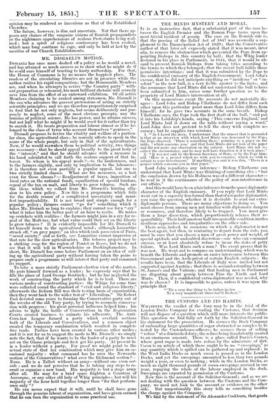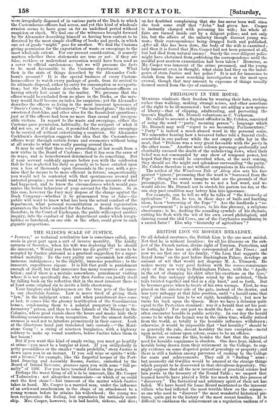THE CUSTOMS AND ITS HABITS.
-WHATEVER the verdict of the Jury may be in the trial of the London Docks Company for evading the Customs, that decision will not dispose of a question which still more interests the public. This question we find fully set forth by the Solicitor-General in his statement for the prosecution. He accuses the Dock Company of embezzling large quantities of sugar abstracted as samples to be tested by the Customhouse-officers ; he accuses them of selling "refuse " at a diminished duty, the refuse being fraudulently created to an enormous amount. There is a place called Davis's Corner, where good sugar is made into refuse by the admixture of dirt. Cocoa is an article of which there ought to be no "sweepings," as any quantity which is spilled can be gathered up and replaced : in the West India Docks as much cocoa is passed as in the London Docks, and yet the sweepings amounted to less than two pounds weight a year, or even to nothing ; while in the London Docks, as much as eight thousand pounds of cocoa-sweepings accrued in one year, repaying the whole of the labour employed in the dock. Sweepings are exported by permission of the Customs.
Now this is the account of the Solicitor-General ; and as we are not dealing with the question between the Customs and the Com- pany, we need not look to the account or evidence on the other side. But unqestionably this story tells us something besides the charge against the Company.
We find by the statement of Sir Alexander Cockburn, that goods were irregularly disposed of in various parts of the Dock to which the Customhouse-officers had access, and yet this kind of wholesale OVILSion seems to have gone on for an undefined period without suspicion or check. We find one of the witnesses brought forward by Sir Alexander describing himself as having been content to be deceived by the most simple shuffling of books and goods, in which one set of goods "might' pass for another. We find the Customs giving permission for the exportation of waste or sweepings to the most wholesale extent. For our present consideration, it scarcely matters whether these statements are true or not : if they are false, reckless or malevolent accusation would have been used as a cover to official carelessness ; but we will presume the facts to be most favourable to the Customs department. What then is the state of things described by Sir Alexander Cock- burn's account ? It is the special business of every Custom- house-officer to watch every package of goods, from its arrival to its ultimate disposal, either by entry for consumption or reexporta- tion; but Sir Alexander describes the Customhouse-officers as having utterly lost count in the matter. We presume that the officer would be excluded from no place in the Docks, or the mys- tery would itself become an index for suspicion ; yet Sir Alexander describes the officers as living in the most innocent ignorance of "Davis's Corner,' the "laboratory," "the inclined plane," the richly sweetened dust-bins, and other sites for the fraudulent operations ; just as if the officers had been no more than casual and irrespon- sible visiters. In regard to the waste and sweepings, either the Customs gave permission, habitually, for the reexport of what it did not see, or if it did see, it permitted these gigantic sweepings to be carried off without entertaining a suspicion. Sir Alexander Cockburn's description suggests the idea that the Customhouse- officers went through certain forms and ceremonies without being at all awake to what was really passing around them.
It may be said that these very proceedings at law result from a new virtue in the Board of Customs ; that it has seen the error of its ways, and is henceforward determined to do something. But if your servant suddenly appears before you with the confession that he has neglected his duty so grossly as to have entailed upon you a loss of thousands upon thousands in the year, with a pro- mise that he means to be more efficient in future, unquestionably you would not be contented with that spontaneous avowal and untested promise ; you would want to see precise accounts of what had happened, and to know the circumstances which would gua- rantee the better behaviour of your servant for the future. So in this case, however the Jury may dispose of the charge against the Dock Company—whether it be pronounced true or false—the public will want to know what has been the actual conduct of the department, what personal reconstitution or moral regeneration guarantees the better conduct for the future. Besides the inquiry, therefore, in the Court of Exchequer, the public will expect another inquiry, into the conduct of that department under which irregu- larities so barefaced, on one side or the other, could grow to such gigantic proportions.



























 Previous page
Previous page